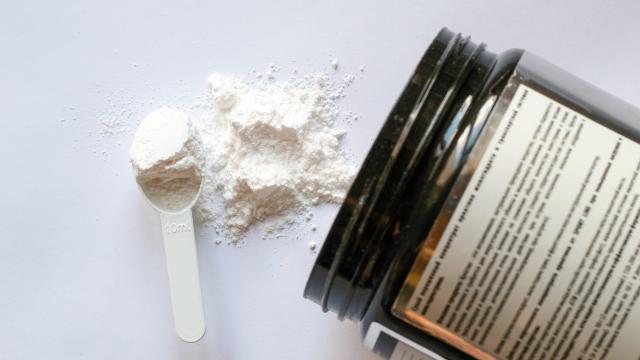Creatine is one of the most popular supplements for people who lift, and with good reason: There’s significant evidence showing it’s safe to take and effective at helping you build muscle. But myths persist, so let’s take a look at a few of them.
Myth: It’s a steroid or some kind of scary drug
The truth: It’s not. Creatine is a substance that our bodies make naturally, and we also get it in our diet. A pound of meat contains about a gram of creatine; a typical dose of creatine as a supplement is 3-5 grams per day. Creatine from supplements just adds to what we naturally consume. (That said, if your body is good at making creatine or if you eat a lot of meat, the supplement may not have much to add. That seems to be why some people respond better to the supplement than others.)
[referenced id=”883725″ url=”https://www.lifehacker.com.au/2019/05/proxx-is-a-perfect-minesweeper-clone/” thumb=”https://www.gizmodo.com.au/wp-content/uploads/sites/4/2019/07/27/olc1yerx9b0ew3wy4p8z.jpg” title=”Proxx Is A Perfect Minesweeper Clone” excerpt=”I’ve never been good at Minesweeper, and I think I must have been at least half my age the last time I played the game. It’s hard to make the click-you’re fine, click-you’re dead gameplay sexy, but Google has done an admirable job with its open-source iteration, Proxx.”]
Another difference between creatine and steroids — besides the fact that they are completely different in terms of chemistry and biology — is that creatine’s benefits, while well-supported, are minor. It may help you get a few extra reps on a max-effort set, or shave a tiny bit off your sprinting time. Over hundreds of workouts, the extra effects add up, but it’s not going to make you massively larger or stronger.
Myth: You have to cycle on and off
The truth: You don’t. When creatine first became popular, there were still some unanswered questions about how the human body would react to being on it long term. Would we stop making our own natural creatine? Would it be harmful to our kidneys?
One way to deal with that uncertainty was to take creatine for a short time and then stop taking it for a while. But it turns out that there’s no need to cycle; creatine keeps working and our bodies keep making creatine even with long-term supplementation.
And people don’t suffer kidney damage from taking creatine, although if you get a kidney function test your doctor may notice elevated creatinine levels. (Creatinine is a product of creatine breakdown, which is normal, but in people who don’t take supplemental creatine it can be a sign of kidney damage.) There’s some disagreement on whether creatine is safe for people who already have kidney problems; talk to your doctor if that’s a concern for you.
Myth: It doesn’t work for women
The truth: Creatine studies have been conducted with more male subjects than female, but creatine is effective and has very few downsides for women.
There may be subtle differences between how men and women metabolize and use creatine. For example, this review paper points out that women may have more creatine in their muscles to start with, simply due to having smaller muscles on average. There may also be hormonal reasons why creatine has more of an effect during certain times, like pregnancy and certain stages of the menstrual cycle. But this doesn’t change the big picture: If you lift or play a sport where creatine supplementation can help, you’ll likely benefit from creatine, no matter your gender.
Myth: You have to take creatine at a certain time or in a certain way
The truth: Creatine builds up in your body over time, so the recommendation is to just take a dose every day to keep your stores topped up. That means you should take it on rest days as well as workout days, and also that it doesn’t matter whether you take it before your workout, after your workout, or at any other time of day.
Creatine monohydrate is generally the cheapest kind and the easiest to find; none of the alternative formulations like creatine citrate have been shown to be better.
When you first start taking creatine, you can do a “loading dose” for a week if you like; this gets your creatine stores topped up a bit faster. But you can also just start taking a daily dose; you’ll realise the full effects within a few weeks.

Leave a Reply
You must be logged in to post a comment.